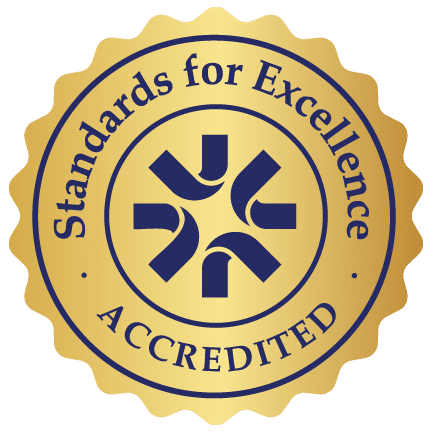Accreditation Application FAQs


A great first step towards earning accreditation is to fill out the Standards for Excellence Self-Assessment. The self-assessment is meant to measure an organization’s current adherence to the benchmarks in the Standards for Excellence code and will help to reveal what the nonprofit needs to focus on, in which areas to get started, and how long the process may take.
Yes! Download the Questions in the Standards for Excellence Accreditation Application
The short answer is yes, go ahead and start the process. A newer nonprofit can use the Standards for Excellence as a framework for setting up their organization strong to start. As they complete the different items requested in the application, they can upload them to the online form. After answering all of the questions, they can submit the application for review. During the review process, if the application reviewers feel there is something that needs to be put in front of the board, they will work with the nonprofit on that. It’s possible the review process could take a bit longer for newer organizations, but nonprofits are welcome to go ahead and start the application.
Once an organization earns the Seal of Excellence, a letter indicating that the organization has earned the seal is sent to the organization’s executive director and board chair (or equivalent). With the letter, the organization’s leadership is asked to sign a licensing agreement with the Standards for Excellence Institute that outlines a seal holder’s continuing obligations to operate according to the benchmarks during the term of the license. One of the other obligations of seal holders is to pay an annual license fee. License fees are determined by the organization’s budget size and membership status (with the Standards for Excellence Institute or with one of the Standards for Excellence program’s licensed replication partners). View the license fee schedule.
Organizations that earn the Seal of Excellence accreditation initially hold the license to display the seal for three years. At the end of the three years, in order to continue as an accredited organization, seal holders are required to submit a renewal application. This provides the opportunity for the seal holder to illustrate that they continue to live by the benchmarks in the Standards for Excellence code. Organizations complete the same online application form for renewal application as they completed for the initial application. To help make the renewal process as streamlined as possible, the Standards for Excellence Institute will auto-populate past application submission data into your renewal application.
Once the organization successfully completes the first renewal, the organization will then be up for renewal on a five-year renewal cycle. Renewal is the same for Basics and Basics Enhanced recognition with the exception of the timing, which is offered for recognized groups on a consistent three-year cycle.
Yes, membership has a separate fee but includes many benefits, including a discount on the accreditation application. Note that some nonprofits may be eligible for membership in (and access to resources from) a licensed replication partner, based on the nonprofit’s location or affiliation. It would not need to join the Institute if it is a member of Maryland Nonprofits or a replication partner. See the list of replication partners.
Nonprofit leaders may contact the Standards for Excellence Institute’s Manager for Accreditation and Recognition, Kate Hull, at khull@standardsforexcellence.org with any questions about the application process, online submission, or program requirements.
They may also reach out to one of the more than 300 Standards for Excellence Licensed Consultants to engage a consultant who has been trained and licensed in all aspects of the Standards for Excellence code. Licensed Consultants are independent from the Institute and establish their own pricing and fees. Search for a Standards for Excellence Licensed Consultant
The answer depends on the applying organization and how much work needs to be completed before submitting. It is hard to predict how long it will take an applicant to complete the application. The Standards for Excellence Institute is available to help nonprofits set goals, and to answer questions throughout the application journey. Once submitted, the review process will start when the application fee is paid. For Basics applicants, the review process usually takes 4-6 weeks. For full accreditation the review process on average takes 4-6 months as each application goes through three reviews and there may be clarifying questions the organization needs to answer after each review.
It can be helpful to track the answers to the application questions in a separate document alongside filling out the application.
Once the nonprofit receives full accreditation, it is consider a seal holder. It will receive a press release kit that includes the logos, guidelines for posting on social media, and other tools to help it market this achievement!
After the nonprofit receives notification of its award, it will sign a licensing agreement.
Accredited organizations can use the Seal of Excellence on their website and other organization materials. The Seal is a symbol the public and donors trust.
Three years after the first accreditation (and following the first renewal, on a five year cycle), the nonprofit will participate in a renewal process, a mechanism to ensure that the organization continues to adhere to the Standards for Excellence code in its operations and governance and that it utilizes a continuous improvement process to undertake higher levels of excellence. (There is an Application Renewal fee that mirrors the application fee.)
There is an annual licensing fee for organizations that are Standards for Excellence accredited.